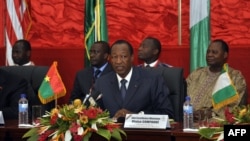The Economic Community of West African States (ECOWAS) has resolved differences with Mali over the deployment of a standby force to quell a rebellion in the West African country, according to an ECOWAS official.
“We have just concluded a meeting of chiefs of defense staff with their counterparts from Mali to be able to harmonize perspective in relation to the goal to the ECOWAS mission in Mali vis-à-vis the security challenges in the country,” said Sonny Ugoh, ECOWAS communications director.
His comments came after Mali’s interim leader, Dioncounda Traore, formally requested ECOWAS’ military assistance to fight terrorism and recover occupied territory in the north.
ECOWAS protocol stipulates that a standby force can be deployed only after a formal request is made by a member state of the bloc.
ECOWAS has said it is ready to deploy a standby force of some 3,000 troops to northern Mali, where Islamist rebels are trying to impose a harsh form of Sharia, or Islamic law. The rebels seized control of the area in April after renegade soldiers overthrew the elected government in Bamako.
Recently, Guinea intercepted a shipment of weapons apparently ordered for Mali’s army. Officials in Conakry intercepted the shipment after expressing concern that the arms could fall in the hands of insurgents who have seized control of northern Mali.
But, Ugoh said ECOWAS officials are holding talks with Guinea’s government to secure release the arms shipment. He said the weapons could be used to help equip the Mali military to fight the rebellion.
“We are hoping that there would be an amicable resolution so that the armed forces of Mali would be better equipped for the challenges ahead, against the background of specifically the challenge in the north of Mali,” Ugoh said.
Last week, rebels of the Movement for Unity and Jihad in West Africa (known by its French acronym MUJAO) seized control of the strategic town of Douentza.
Ugoh said the capture of Douentza is a challenge to both ECOWAS and Mali’s government.
“For every day that there is a delay, the situation deteriorates and now we can see the evidence of this deterioration, which makes it more compelling for us to act in unity and for us to act as expeditiously as possible in resolving the situation,” he said.
“We have just concluded a meeting of chiefs of defense staff with their counterparts from Mali to be able to harmonize perspective in relation to the goal to the ECOWAS mission in Mali vis-à-vis the security challenges in the country,” said Sonny Ugoh, ECOWAS communications director.
His comments came after Mali’s interim leader, Dioncounda Traore, formally requested ECOWAS’ military assistance to fight terrorism and recover occupied territory in the north.
ECOWAS protocol stipulates that a standby force can be deployed only after a formal request is made by a member state of the bloc.
ECOWAS has said it is ready to deploy a standby force of some 3,000 troops to northern Mali, where Islamist rebels are trying to impose a harsh form of Sharia, or Islamic law. The rebels seized control of the area in April after renegade soldiers overthrew the elected government in Bamako.
Recently, Guinea intercepted a shipment of weapons apparently ordered for Mali’s army. Officials in Conakry intercepted the shipment after expressing concern that the arms could fall in the hands of insurgents who have seized control of northern Mali.
But, Ugoh said ECOWAS officials are holding talks with Guinea’s government to secure release the arms shipment. He said the weapons could be used to help equip the Mali military to fight the rebellion.
“We are hoping that there would be an amicable resolution so that the armed forces of Mali would be better equipped for the challenges ahead, against the background of specifically the challenge in the north of Mali,” Ugoh said.
Last week, rebels of the Movement for Unity and Jihad in West Africa (known by its French acronym MUJAO) seized control of the strategic town of Douentza.
Ugoh said the capture of Douentza is a challenge to both ECOWAS and Mali’s government.
“For every day that there is a delay, the situation deteriorates and now we can see the evidence of this deterioration, which makes it more compelling for us to act in unity and for us to act as expeditiously as possible in resolving the situation,” he said.





